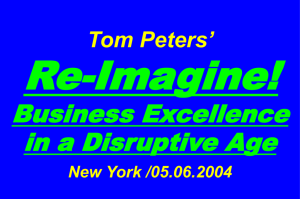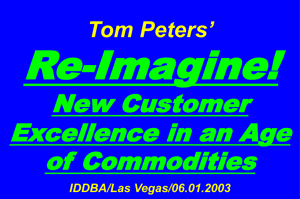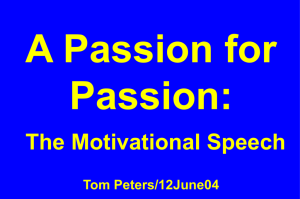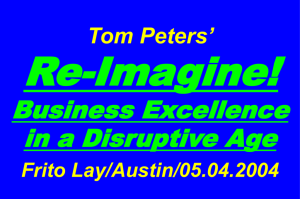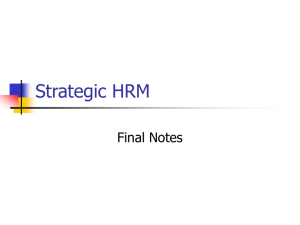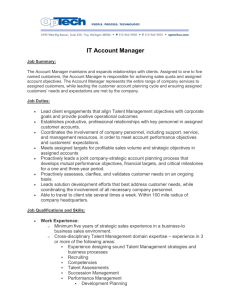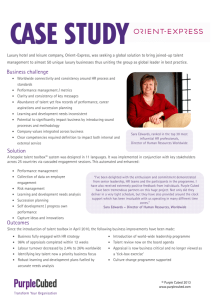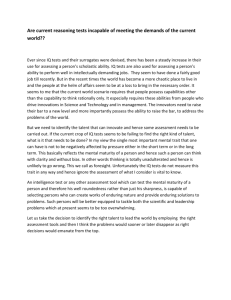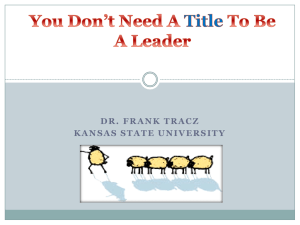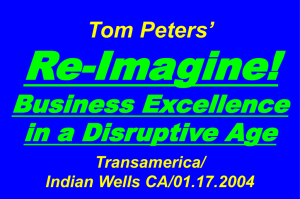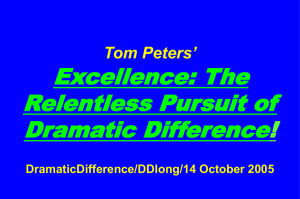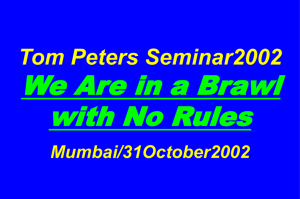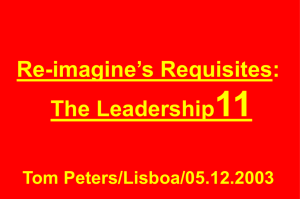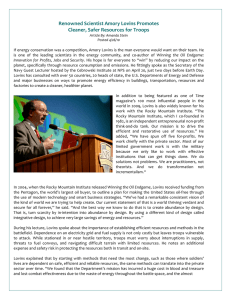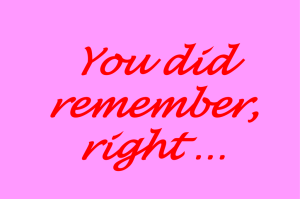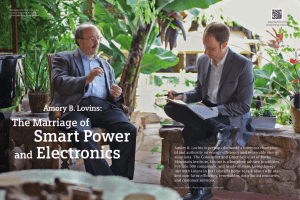Issue Y2K The Great War for Talent!
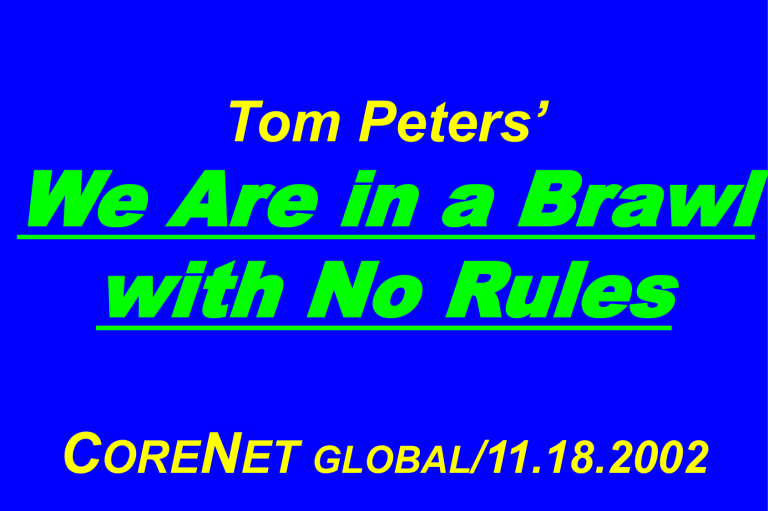
Tom Peters’
We Are in a Brawl with No Rules
C ORE N ET GLOBAL /11.18.2002
All slides at …
tompeters.com
1. The Fundamental
Premises of
Organizational Life
Have Been Shattered.
“We are in a brawl with no rules.”
Paul Allaire
“IT MAY SOMEDAY BE SAID THAT THE 21 ST
CENTURY BEGAN ON SEPTEMBER 11, 2001. …
“Al-Qaeda represents a new and profoundly dangerous kind of organization —one that might be called a ‘virtual state.’
On September 11 th a virtual state proved that modern societies are vulnerable as never before.”—Time/09.09.2002
“The deadliest strength of America’s new adversaries is their very fluidity, Defense Secretary Donald
Rumsfeld believes. Terrorist networks, unburdened by fixed borders, headquarters or conventional forces, are free to study the way this nation responds to threats and adapt themselves to prepare for what Mr. Rumsfeld is certain will be another attack. …
“ ‘Business as usual won’t do it,’ he said. His answer is to develop swifter, more lethal ways to fight. ‘Big institutions aren’t swift on their feet in adapting but rather ponderous and clumsy and slow.’ ” —
The New York Times/09.04.2002
“Dawn Meyerreicks, CTO of the Defense Intelligence Systems Agency, made one of the most fateful military calls of the 21 st century. After 9/11 … her office quickly leased all the available transponders covering Central Asia. The implications should change everything about U.S. military thinking in the years ahead.
“The U.S. Air Force had kicked off its fight against the Taliban with an ineffective bombing campaign, and Washington was anguishing over whether to send in a few Army divisions. Donald Rumsfeld told Gen. Tommy Franks to give the initiative to 250 Special Forces already on the ground. They used satellite phones, Predator surveillance drones, and GPS- and laser-based targeting systems to make the air strikes brutally effective.
“In effect, they ‘Napsterized’ the battlefield by cutting out the middlemen
(much of the military’s command and control) and working directly with the real players.
… The data came in so fast that HQ revised operating procedures to allow intelligence analysts and attack planners to work directly together.
Their favorite tool, incidentally, was instant messaging over a secure network.”—Ned Desmond/“Broadband’s New Killer App”/Business 2.0/
OCT2002
“If you don’t like change, you’re going to like irrelevance even less.”
—General Eric
Shinseki, Chief of Staff, U. S. Army
2. We Live in a
World of Virtual
Organizations.
“The corporation as we know it, which is now 120 years old, is not likely to survive the next 25 years.
Legally and financially, yes, but not structurally and economically.”
Peter Drucker, Business 2.0 (08.00)
Eric’s Army
Flat.
Fast.
Agile.
Adaptable.
Light … But Lethal.
Brand You/ Talent/ “I Am An ARMY Of
One.”
Info-intense.
Network-centric.
“Ebusiness is about rebuilding the organization from the ground up.
Most companies today are not built to exploit the Internet.
Their business processes, their approvals, their hierarchies, the number of people they employ … all of that is wrong for running an ebusiness.”
Ray Lane, Kleiner Perkins
Gerstner’s IBM:
Systems
Integrator of choice.
Global Services:
$35B.
Pledge/’99: Business
Partner Charter. 72 strategic partners, aim for 200. Drop many in-house programs/products.
(BW/12.01).
“We want to be the air traffic controllers of electrons.”
Bob Nardelli, GE Power Systems
3. Welcome to …
Low-rise World .
Wal*Mart vs.
Sears
Manhattan/ Chicago vs.
Silicon Valley/
Austin/ Seattle/
Bangalore
“The organizations we created have become tyrants. They have taken control, holding us fettered, creating barriers that hinder rather than help our businesses. The lines that we drew on our neat organizational diagrams have turned into walls that no one can scale or penetrate or even peer over.”
—Frank Lekanne Deprez &
Ren é Tissen, Zero Space: Moving Beyond Organizational Limits.
square feet
108 X 5 vs.
8 X 1
= 540 vs. 8 (-98.5%)
E.g. …
Jeff Immelt: 75% of “admin, back room, finance” “digitalized” in years.
Source: BW (01.28.02)
IBM’s Project
eLiza
!*
* “Self-bootstrapping”/ “Artilects”
“If there is nothing very special about your work, no matter how hard you apply yourself, you won’t get noticed, and that increasingly means you won’t get paid much either.”
Michael Goldhaber, Wired
I AM AN
ARMY OF
ONE
4. Women
Rule!
Stupid:
“Amazing, now that I think about it. A bunch of guys --developers, architects, contractors, engineers, bankers--sitting around designing shopping centers.
And the ‘end users’ will be overwhelmingly women!”
$4.8T
> Japan
9M/27.5M/$3.6T
> Germany
Business
Purchasing Power
Purchasing mgrs. & agents: 51%
HR: >>50%
Admin officers: >50%
Source: Martha Barletta, Marketing to Women
Ad from Furniture /Today (04.01):
“MEET WITH THE EXPERTS!: How
Retailing’s Most Successful Stay that Way”
Presenting Experts:
M
=
16
;
F
=
??
(94% = 272)
“Please … just
one
couch or chair where my feet hit the ground!”
—Owner,
5 furniture stores, UK
“AS LEADERS, WOMEN
RULE: New Studies find that female managers outshine their male counterparts in almost every measure”
Title, Special Report, Business Week, 11.20.00
Women’s Strengths Match New Economy
Imperatives: Link [rather than rank] workers; favor interactive-collaborative leadership style
[empowerment beats top-down decision making]; sustain fruitful collaborations; comfortable with sharing information; see redistribution of power as victory, not surrender; favor multi-dimensional feedback; value technical & interpersonal skills, individual & group contributions equally; readily accept ambiguity; honor intuition as well as pure
“rationality”; inherently flexible; appreciate cultural diversity
Source: Judy B. Rosener, America’s Competitive Secret:Women Managers
Psssst!
Wanna see my “porn” collection?
5. Talent
Must Be
Served.
From “1, 2 or you’re out” [JW] to …
“Best Talent
in each industry segment to build best proprietary intangibles”
[EM]
Source: Ed Michaels, War for Talent (05.17.00)
“Our business needs a massive transfusion of talent, and talent, I believe, is most likely to be found among non-conformists, dissenters and rebels.”
David Ogilvy
6. Design =
Seat of the
Soul
“We don’t have a good language to talk about this kind of thing. In most people’s vocabularies, design means veneer. … But to me, nothing could be further from the meaning of design.
Design is the fundamental soul
of a manmade creation.”
Steve Jobs
All Equal Except …
“At Sony we assume that all products of our competitors have basically the same technology, price, performance and features.
Design is the only thing that differentiates one product from another in the marketplace.”
Norio Ohga
THE BASE CASE: I am a design fanatic. Though not
“artistic,” I love “cool stuff.” But it goes [much] further, far beyond the personal. Design has become a professional obsession. I SIMPLY BELIEVE THAT
DESIGN PER SE IS THE PRINCIPAL REASON
FOR EMOTIONAL ATTACHMENT [or detachment]
RELATIVE TO A PRODUCT OR SERVICE OR
EXPERIENCE.
Design, as I see it, is arguably the
#1 DETERMINANT of whether a productserviceexperience stands out … or doesn’t.
Furthermore, it’s another “one of those things” that damn few companies put – consistently – on the front burner.
“The worst epithet you’ll see in this book is
‘It won an award.’ ”
—Don Norman*
*C.f. Jane Jacobs, Chris Alexander (Pattern
Language)
7. “Real Estate” =
Design+ =
EXPERIENCES!
“
Experiences
are as distinct from services as services are from goods.”
Joseph Pine & James Gilmore, The Experience Economy:
Work Is Theatre & Every Business a Stage
“The [Starbucks] Fix” Is on …
“We have identified a ‘third place.’ And I really believe that sets us apart. The third place is that place that’s not work or home.
It’s the place our customers come for refuge.”
Nancy Orsolini, District Manager
“Club Med
is more than just a ‘resort’; it’s a means of rediscovering oneself, of inventing an entirely new ‘me.’ ”
Source: Jean-Marie Dru, Disruption
Experience: “Rebel Lifestyle!”
“What we sell is the ability for a 43-year-old accountant to dress in black leather, ride through small towns and have people be afraid of him.”
Harley exec, quoted in Results-Based Leadership
Bob Lutz:
“I see us as being in the art business. Art, entertainment and mobile sculpture, which, coincidentally, also happens to provide transportation.”
Source: NYT 10.19.01
DREAM: “A dream is a complete moment in the life of a client.
Important experiences that tempt the client to commit substantial resources. The essence of the desires of the consumer. The opportunity to help clients become what they want to be.” —Gian Luigi
Longinotti-Buitoni
The marketing of Dreams (Dreamketing)
Dreamketing: Touching the clients’ dreams.
Dreamketing: The art of telling stories and entertaining.
Dreamketing: Promote the dream, not the product.
Dreamketing: Build the brand around the main dream.
Dreamketing: Build the “buzz,” the
“hype,” the “cult.”
Source: Gian Luigi Longinotti-Buitoni
8. Green =
Revolution
“The best solutions are not based on tradeoffs or ‘balance’ between objectives but on design integration achieving all of them together ”—Paul Hawken &
Amory Lovins/ Natural Capitalism: The Next
Industrial Revolution
“Tunneling through the cost barrier”/ “Forget diminishing returns”/ “Saving a large amount of energy or resources often costs less than saving a small amount.”/ “Change of design mentality”
—Hawken/
Lovins/ Natural Capitalism
“The U.S. buildings and construction materials industries reinvest only about one percent of their revenue in
R&D, compared with ten to twenty times that for cutting-edge industries like electronics and pharmaceuticals.
No wonder their techniques and materials are so antediluvian.” —Paul
Hawken & Amory Lovins, Natural Capitalism
9. Technicolor
Times Call For
Technicolor
Responses.
Forget>“Learn”
“The problem is never how to get new, innovative thoughts into your mind, but how to get the old ones out .”
Dee Hock
“It is generally much easier to kill an organization than change it substantially.”
Kevin Kelly, Out of Control
“Incrementalism is innovation’s worst enemy.”
Nicholas Negroponte
The greatest danger for most of us is not that our aim is too high and we miss it, but that it is too low and we reach it.
Michelangelo
“Don’t rebuild.
Reimagine.”
The New York Times Magazine on the future of the WTC space in Lower Manhattan/09.08.2002
